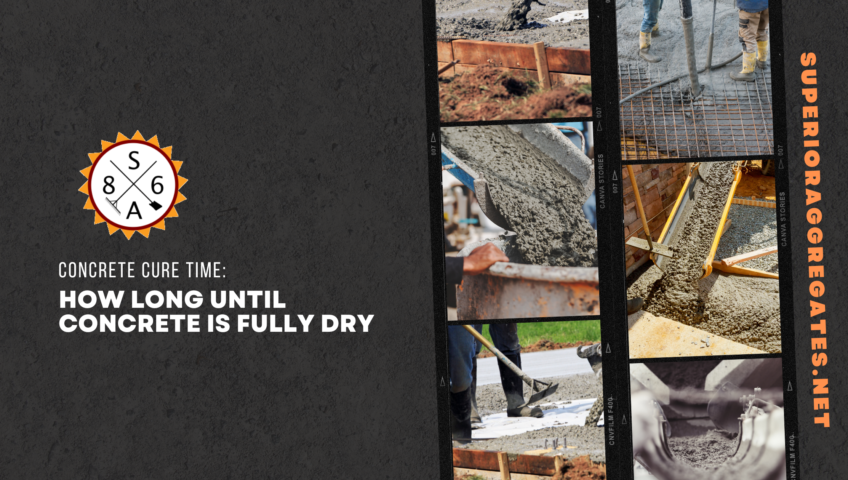
CONCRETE CURE TIME: HOW LONG UNTIL CONCRETE IS FULLY DRY
When concrete contractors install a driveway, sidewalk, patio, or concrete slab floor, they will advise the client that the surface must cure before being walked or driven upon. Concrete cure time is the process of allowing the new surface to fully dry and develop its strength and water resistance in the process.
Proper concrete curing will also improve the mechanical properties of the new surface, such as delaying any shrinkage and resisting any cracking while the new floor is still drying. The slower the concrete cure time, the more moisture will remain in the material, which will allow for a stronger, more durable concrete floor.
Different concrete cure methods
The amount of time it will take for any concrete cure time depends upon many factors, such as how much moisture is in the air, sunlight, temperature, along with the composition of the cement. Also, there are 3 main concrete drying methods that may affect how long concrete contractors will advise customers to stay off the new concrete floor.
- Water curing involves sprinkling, misting, or ponding of the surface with water.
- Concrete coverage slows down curing with wet sand, wet burlap, or wet straw
- Waterproof barriers such as plastic film or waterproof paper
The purpose of each curing method is to retain moisture in the concrete for as possible to as the new surface gains additional strength. This process of developing strength is actually the growth of a crystal matrix (or hard finger-like projections) within the concrete as the Portland cement reacts with water.
This intertwining of the cement, sand, and gravel is what makes concrete one of the most durable surfaces for supporting the weight of cars and SUVs, tractor trailers, and large machinery.
How long should concrete dry?
When it come to concrete cure time, always follow the suggestions of concrete contractors that have installed your new concrete surface. But, general concrete cure times are as follows:
- 24 to 48 hours – after the initial concrete pour, the forms can be removed, and the new concrete surface can withstand foot traffic, so people can walk on the surface
- 7 -10 days – which is just a partial concrete cure time, but the new surface can support vehicular traffic and the movement of equipment across the floor.
- 28 days – in just under 30 days, the concrete should be fully cured and can handle the full weight or full pounds per square foot as determined by the concrete mix strength
These time considerations will also depend on the quality and strength of the concrete mixture, the thickness of the concrete slab, any adverse weather conditions, along with the professionalism of the installation.
Problems with concrete that is not cured correctly
When the full concrete cure time is not allowed before substantial weight is applied to the new surface, the surface’s durability, water-tightness, and strength will all be diminished. Also, improper curing can result in a concrete floor or surface that will tend to develop thermal cracks and plastic shrinkage cracks.
Once cracks start to develop throughout the concrete, you can expect water infiltration, weed growth, chipping, spalling, dips, and bulges that will make the surface unsightly, difficult to walk/drive on, and will greatly reduce the life span of the concrete surface.
To avoid these problems with concrete slab that is not installed or cured properly, always use professional concrete contractors for your projects.
When concrete contractors install a driveway, sidewalk, patio, or concrete slab floor, they will advise the client that the surface must cure before being walked or driven upon. Concrete cure time is the process of allowing the new surface to fully dry and develop its strength and water resistance in the process.
Proper concrete curing will also improve the mechanical properties of the new surface, such as delaying any shrinkage and resisting any cracking while the new floor is still drying. The slower the concrete cure time, the more moisture will remain in the material, which will allow for a stronger, more durable concrete floor.
Different concrete cure methods
The amount of time it will take for any concrete cure time depends upon many factors, such as how much moisture is in the air, sunlight, temperature, along with the composition of the cement. Also, there are 3 main concrete drying methods that may affect how long concrete contractors will advise customers to stay off the new concrete floor.
- Water curing involves sprinkling, misting, or ponding of the surface with water.
- Concrete coverage slows down curing with wet sand, wet burlap, or wet straw
- Waterproof barriers such as plastic film or waterproof paper
The purpose of each curing method is to retain moisture in the concrete for as possible to as the new surface gains additional strength. This process of developing strength is actually the growth of a crystal matrix (or hard finger-like projections) within the concrete as the Portland cement reacts with water.
This intertwining of the cement, sand, and gravel is what makes concrete one of the most durable surfaces for supporting the weight of cars and SUVs, tractor trailers, and large machinery.
How long should concrete dry?
When it come to concrete cure time, always follow the suggestions of concrete contractors that have installed your new concrete surface. But, general concrete cure times are as follows:
- 24 to 48 hours – after the initial concrete pour, the forms can be removed, and the new concrete surface can withstand foot traffic, so people can walk on the surface
- 7 -10 days – which is just a partial concrete cure time, but the new surface can support vehicular traffic and the movement of equipment across the floor.
- 28 days – in just under 30 days, the concrete should be fully cured and can handle the full weight or full pounds per square foot as determined by the concrete mix strength
These time considerations will also depend on the quality and strength of the concrete mixture, the thickness of the concrete slab, any adverse weather conditions, along with the professionalism of the installation.
Problems with concrete that is not cured correctly
When the full concrete cure time is not allowed before substantial weight is applied to the new surface, the surface’s durability, water-tightness, and strength will all be diminished. Also, improper curing can result in a concrete floor or surface that will tend to develop thermal cracks and plastic shrinkage cracks.
Once cracks start to develop throughout the concrete, you can expect water infiltration, weed growth, chipping, spalling, dips, and bulges that will make the surface unsightly, difficult to walk/drive on, and will greatly reduce the life span of the concrete surface.
To avoid these problems with concrete slab that is not installed or cured properly, always use professional concrete contractors for your projects.

